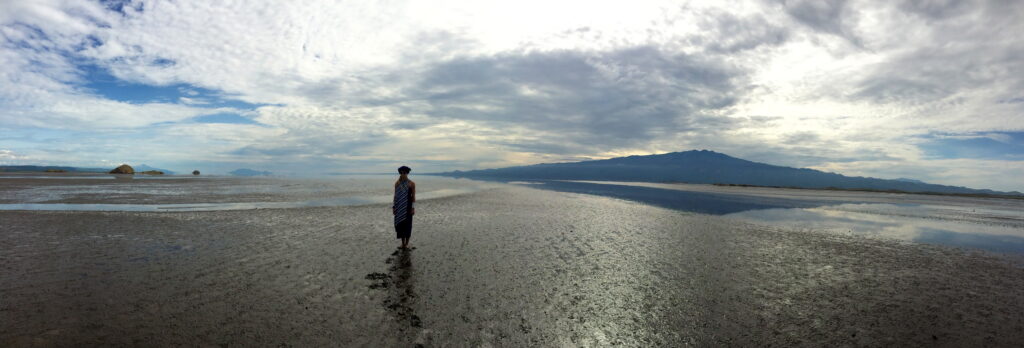SIT wins Fulbright-Hays grant for 2024 climate change program in Tanzania
Announcement Date: July 24, 2023 | Faculty, School for International Training
Goal is to infuse African perspectives into U.S. classrooms

Twelve U.S. college and high school educators will have the opportunity to learn African perspectives and witness African responses to climate change next summer, thanks in part to a U.S. Department of Education Fulbright-Hays Group Projects Abroad Program grant to School for International Training (SIT).
On the program Tuko Pamoja: Tanzanian Creativity and Perspectives in an Era of Climate Change, SIT will welcome six college and six high school educators to Tanzania-Zanzibar for a five-week experiential seminar in June and July 2024. In coastal Zanzibar, urban Dar es Salaam and mountainous Arusha, the educators will meet with researchers, practitioners, and professionals, including smallholder farmers and members of the Maasai community, to discuss livelihoods, coastal environments, food production, the arts, and education. The program will focus on how Tanzanian communities draw on their knowledge to confront the impacts of climate change.
“SIT’s main goal is to infuse African perspectives into U.S. classrooms and curricula when discussing climate change,” said Project Director Dr. Jonathan Walz. “Whether our participants are educators in humanities, social studies, languages or area studies, each will be able to reflect on the practices and social and environmental histories encountered in Tanzania as examples of African communities’ creative adaptions to the impacts of climate change.”
Educators will be able to bring these new and diverse perspectives back to their U.S. classrooms and students, integrate new material into their teaching, and help their U.S. students gain an international outlook and new approaches to problem solving of this critical global issue.
Dr. Said Graiouid, SIT Provost and Dean of Faculty
SIT Provost and Dean of Faculty Dr. Said Graiouid said, “Educators will be able to bring these new and diverse perspectives back to their U.S. classrooms and students, integrate new material into their teaching, and help their U.S. students gain an international outlook and new approaches to problem solving of this critical global issue.”
Noting that SIT has the largest portfolio of programs on the African continent of any U.S. study abroad provider, Graiouid said the organization has redoubled efforts to generate more interest in the continent at a time when many U.S. students are opting to study in countries that feel more familiar to them, such as Europe and Australia.

Tanzania can be seen as a microcosm of the African continent, Walz said, a place where diverse people are responding in creative and innovative ways to environmental changes.
“Coastal and island environments such as Zanzibar bear the brunt of sea level change and the increased frequency of severe climate events, including mega-cyclones, typhoons, flooding, and coral bleaching. In such ecosystems, human communities face threats to water, food, and energy sources,” he noted.
Walz is associate professor and chair of SIT’s graduate MA in Climate Change and Global Sustainability. He is also academic director of an undergraduate program based in Stone Town, Zanzibar, focused on coastal ecology and natural resource management. SIT also has an undergraduate program based in Arusha on wildlife conservation and political ecology, which is run by Dr. Oliver Nyakunga. Since 1990, more than 2,000 students have participated in SIT’s undergraduate programs in the country.
The full range of climate impacts and human creativity to understand and address these impacts can be observed in the country and by the responses of its communities, institutions, and organizations.
Dr. Jonathan Walz, SIT academic director and program chair, Zanzibar
Culturally and linguistically diverse, Tanzania’s communities have histories, perspectives, strategies, and expressions that capture and address contemporary climate and environmental changes in the 21st century. Tanzania is one of a very few countries in the world and only one of two countries in sub-Saharan Africa to have both glaciers and coral reefs within its territory, alongside an array of other types of environments.
“In an era of climate change, the full range of climate impacts and human creativity to understand and address these impacts can be observed in the country and by the responses of its communities, institutions, and organizations,” Walz said.
According to the United Nations, Tanzania is one of the 10 fastest growing countries in the world in terms of its human population. With some 40 percent of territory designated as national parks or highly protected areas, the country faces increased pressures on land, water, food, and energy resources.
Participants in the five-week seminar can expect to gain practical and conceptual tools and develop creative artifacts that can support them in infusing African perspectives and creative responses to climate change into their curricula and pedagogies back home. They may also develop partnerships and connections that extend beyond the length of the seminar.
“A U.S. high school educator might also connect with a Tanzanian high school educator who would like to establish a virtual student exchange or a collaborative cross-country project,” said Walz. “The possibilities are myriad, as our program is designed with an intentional eye toward relationship building.”
The application period for Tuko Pamoja: Tanzanian Creativity and Perspectives in an Era of Climate Change is expected to open this fall through the SIT websites.
* * * * * * * * *
Tuko Pamoja: Tanzanian Creativity and Perspectives in an Era of Climate Change was developed with a grant of $142,442 from the Fulbright-Hays Group Projects Abroad (GPA), U.S. Department of Education. That funding is 60 percent of the total cost of the project, with the remaining 40 percent funded by nongovernmental sources. The content of the program does not necessarily represent the policy of the Department of Education and should not be seen as an endorsement by the U.S. government.
